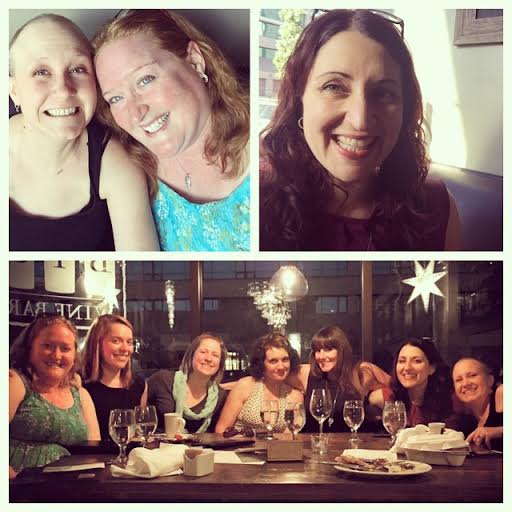This is a post by my friend. I thought it would be interesting to get a friend’s perspective on what it is like to live with a friend with stage IV breast cancer anther recommendations on offering support in this tough situation. My friend likes swear words (her mouthy-tude is one of the reasons we love her).
My friend is dying. Hopefully not tomorrow or even this year. But someday, the insidious disease that is eating away at her bones and her breath one cell at a time will get the best of her. It hasn’t yet. And I’m hopeful that instead of months, we still have years to enjoy. This lovely, brave woman gets up every morning and throws herself back into the battle, one agonizing day at a time. I am awestruck at the way she manages to move through her life with grace, focusing on what matters and leaving the bullshit behind. Her daily acts of struggle and courage humble me.
We’re part of a close-knit group of women that spend evenings drinking wine, throwing around sarcastic quips, and appreciating the hell out of each other. And while none of us have ever directly said so, I know sometimes we feel helpless in the face of this impending loss. When my friend asked me to write a post for her blog about providing support to the terminally ill, I hesitated. It wasn’t just about finding the words that would resonate and convey meaning about something so crucial. I was also afraid I didn’t have the right to give advice when I flounder through it myself. I’m never certain I am doing the right thing, being genuinely helpful and supportive. All I can do is try. And some days that seems woefully inadequate in the face of what my friend is enduring.
But I’ve watched the women in my circle of friends envelop each other with kindness, laughter and unflinching support and I’ve seen the difference it has made in each of our lives. Most of the advice I have to give about being a supportive friend applies for the healthy and the terminally ill alike. It’s about cultivating a relationship and tending it with care and attention. It’s just that your relationship with someone who is terminally ill is a more difficult endeavor, requiring a defter hand. If you want your friendship to thrive despite challenges, you’ll have to invest in doing the things that keep you both strong and help you get the most out of your time together. Here are a few things to focus on.
Give of Yourself
I can’t give my friend more time. God, I wish I could. That one just isn’t up to me. But I can help her make the most of what time she does have. When I give her gifts, I focus on providing things that will maximize her time. I’m always in the kitchen whipping something yummy up, and when I do, I try to put it aside and deliver it to her doorstep once a week. It makes me happy to think she didn’t have to waste energy cooking that night, but that she and her adorable husband still got to enjoy a home cooked meal. Try to offer services where your talents lay. If you live next door, mow the lawn and take care of the yard so your sick neighbor can relax. Maybe you’re pretty handy around the house or you run a cleaning business. Step up and knock off a few projects from the to-do list or stop by twice a month and clean the house. Do the chores and the busy business of everyday life so your friend can focus on the more important aspects of living.
Not sure what your friend could use help with? Our circle of support uses this website to coordinate our efforts so that our friend can simply indicate when and what kind of help she needs and we take care of the rest.
Leave Your Shit at Home
Please don’t mistake me. I am not insisting that you should be cheerful and avoid any discussion about yourself. That is NOT what we are going for here. But if you are feeling especially sad or upset about the situation your friend is in, get some support and clear your head before you visit. They have enough to deal with and they don’t need to worry about your shit, too. It’s okay to be sad. I’d be worried if you weren’t. And you should absolutely have someone you can talk to and lean on about it. But it shouldn’t be your friend. Reach out among your group or to a spouse and help each other cope, so when you do spend time together, it can be about being supportive and positive for your friend.
This also applies to people who think they’ve discovered the latest cure in their Facebook feed. Shut the fuck up. Unless you’re a doctor and the illness is your specialty, you’re not qualified. You can read up and attempt to understand more of what your friend is going through, but leave the diagnosis to the professionals.
If, on the other hand, you want to gab and get some advice about an unrelated situation, don’t hesitate. I remember I was chatting with my friend about a problem at home and before I knew it, I had been gabbing on and on about myself. I went to apologize but she stopped me. “It’s nice to hear about something else for a change,” she confessed. She said she gets tired of every conversation being about her and her illness. There’s still life to be lived and she doesn’t want her health to overshadow the joy of being present for it.
Let Her Be
I think sometimes we make the mistake of talking in clichés to people who are ill, as if we’re trying to give them some locker room half-time motivational speech. Stay strong, sister! Cancer this! Cancer that! We feel as if by remaining unfailingly positive that we’re bolstering them and preventing our friend from giving up in the face of something so overwhelming. And I get the good intentions behind that sentiment. But I worry we create a situation in which the terminally ill person feels they have to put on a brave face and rise to the occasion. That they have to meet your peppy enthusiasm with optimism or risk looking like a negative asshole. I like to take a different approach.
In our group of friends, everyone has their unique way of stepping forward to offer support. One of the women is especially good at cracking jokes and her sarcastic one-liners often diffuse an emotional situation. Another is warmly affectionate and her motherly embraces hide a torrent of tears that fall suddenly and unexpectedly in public places. I like honesty. I try to listen and understand and whatever my friend is that day, so be it. I meet her where she is. I make clear that I don’t want her to leave things unsaid or hide her fear. Our circle of support is a safe place where she can be angry or afraid or exhausted without judgement or expectation. I don’t need her to be strong for me and if I sense she’s putting on her brave face, I try to take her aside and encourage her to drop it for a few moments. I find connection with her in quiet corners, where she lets her doubt spill out. I try to hold those doubts as gently as I would her hopes. I am honored by her trust and often, I don’t have a reassurance. Sometimes it seems like it’s enough just to give those terrible things voice so she can set them free.
Show Up
You’ve heard this before, but I’m gonna say it again. There’s nothing more powerful than this. Just be there. Even if you’re scared. Even if you don’t know what to say. Even if you’ve never done a damn thing like this before in your entire life. It’s okay. Guess what? She’s never been dying before, either. You’re all figuring it out as you go. Ask questions. Even if they’re stupid. You’ll be forgiven. Because you’re there. You’re showing up when it’s hard. There’s value in that and your friend will recognize it.
You don’t need to offer anything. Just listen. Extend a hand. And be there.
I remember watching this video a few years back and it was so powerful and poignant that it immediately changed how I approached being supportive to friends and family. I hope it does the same for you.
Remember, showing up and being present is the best gift you can give.
 Kaz Weida is a SAHM and freelance writer based in Salt Lake City. She’s a serious bibliophile, obsessed with trees and a staunch believer that coffee can cure most of the evils in the world. She has decades of experience in education and behavior management, but still finds herself saying things her mother said like ALL THE TIME. She writes about parenting failures, baking and revelations that come years too late to be useful over at www.asweetlittlelife.com. Her work can be found on sites like Scary Mommy, Wink Books, Parachute and Life Hacks. You can follow her on Facebook or see her pinning obsessively right before birthday parties at Pinterest. For a look at her extensive online portfolio, click here.
Kaz Weida is a SAHM and freelance writer based in Salt Lake City. She’s a serious bibliophile, obsessed with trees and a staunch believer that coffee can cure most of the evils in the world. She has decades of experience in education and behavior management, but still finds herself saying things her mother said like ALL THE TIME. She writes about parenting failures, baking and revelations that come years too late to be useful over at www.asweetlittlelife.com. Her work can be found on sites like Scary Mommy, Wink Books, Parachute and Life Hacks. You can follow her on Facebook or see her pinning obsessively right before birthday parties at Pinterest. For a look at her extensive online portfolio, click here.

